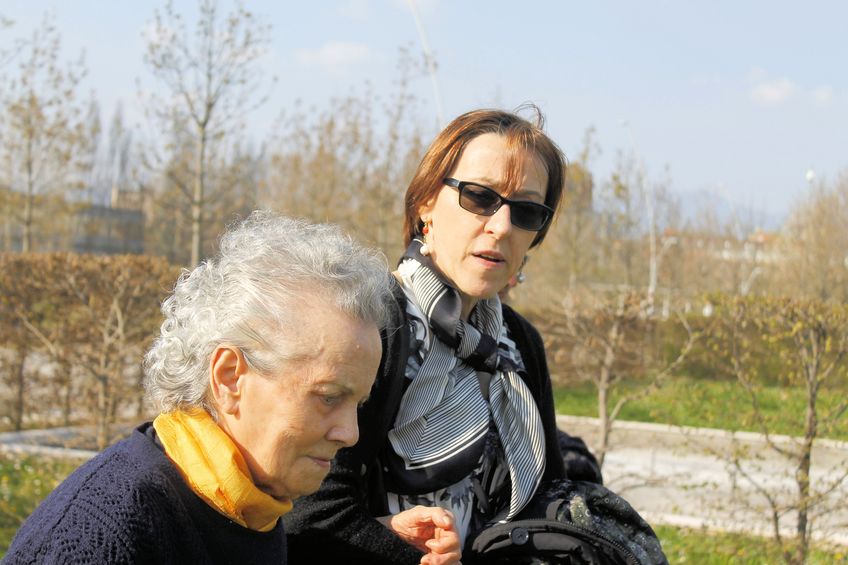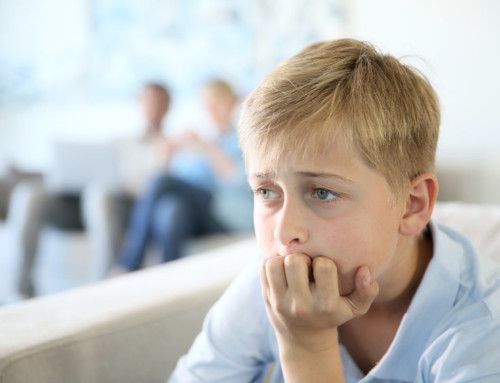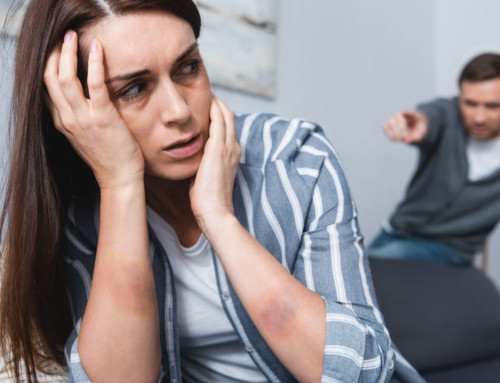A new CDC report reveals the startling impact COVID-19 is having on the mental health of unpaid adult caregivers.
The home phone rings, AGAIN, for the fifth time! I’ve equally ignored the last five calls on my cell phone as ’m trying to get dinner on the table…Four more rings on the home phone and then, my cell phone rings again. Exasperated, I finally answer, “HELLO!”.
“They forgot my pills!” mom complains. “They never get it right. They always forget my pills.”
I try to explain that she doesn’t take her pills until after dinner, and that it might be two hours before she takes her pills. This leads to a convoluted conversation on how many pills she should take, why she has to take them, where they’re located, who will be coming to help, and when she needs to take the morning pills. After only a brief pause in the conversation, the topic changes.
“I’m so lonely,” she says. “Lonely and bored. There’s nothing to do here. There’s never anyone around.”
“You’ll have dinner in just a few minutes,” I explain, trying to get her to think of something pleasant.
“Dinner’s are always cold,” she says. “They never have the stuff I like. I’m not going to eat it.” And so the conversation goes. Mom despondent and confused, me trying to settle her down, encourage her, and help her appreciate the day’s entertainment events that she has likely completely forgotten about. As I talk, I make a mental note of mom’s bills that need paying, the doctor appointments that need to be scheduled, and the personal items that need to be purchased before my next visit. I say goodbye, knowing there will be another handful of similar calls before the night ends, rehashing the same old stuff. Such is the life of an unpaid adult caregiver.
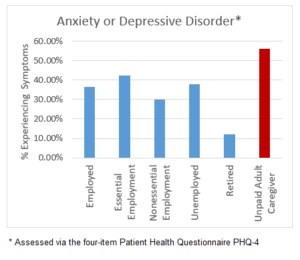 According to a 2019 AARP report, there were 41 million unpaid adult caregivers across the United States in 2017, providing 34 billion hours of care. Most often it’s family members, providing help with personal needs, finances, healthcare tasks, household chores, and doctor appointments. They also visit and call regularly to check in and to let them know they’re still loved. The role of an unpaid adult caregiver has never been an easy one, but according to an August 14, 2020 CDC report, the role has become much more troubling since the onset of COVID-19. This group of workers has suffered more of a mental health impact from the pandemic than any other group in their study, including essential employees, non-essential employees, the unemployed, and the retired. This was true across a number of mental health factors including increases in anxiety, depression, substance use, and thoughts of suicide. And while 32% of non-caregivers experienced one or more mental or behavioral health symptoms related to
According to a 2019 AARP report, there were 41 million unpaid adult caregivers across the United States in 2017, providing 34 billion hours of care. Most often it’s family members, providing help with personal needs, finances, healthcare tasks, household chores, and doctor appointments. They also visit and call regularly to check in and to let them know they’re still loved. The role of an unpaid adult caregiver has never been an easy one, but according to an August 14, 2020 CDC report, the role has become much more troubling since the onset of COVID-19. This group of workers has suffered more of a mental health impact from the pandemic than any other group in their study, including essential employees, non-essential employees, the unemployed, and the retired. This was true across a number of mental health factors including increases in anxiety, depression, substance use, and thoughts of suicide. And while 32% of non-caregivers experienced one or more mental or behavioral health symptoms related to
COVID-19, a whopping 67% of the unpaid adult caregivers suffered these symptoms – a 209% increase compared to those not giving care.
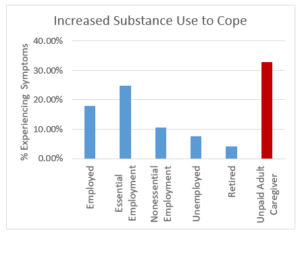 Why such a significant increase since the onset of COVID-19?
Why such a significant increase since the onset of COVID-19?
Being an unpaid adult caregiver has always been a labor of love, taking significant amounts of time, with the stress of handling all the affairs for a loved one, often making very difficult decisions that have major impacts on the lives of those cared for. It’s never been easy, but COVID-19 has made it all the more difficult for the following reasons:
- Loved One’s Quality of Life – The elderly are more at risk of serious illness from COVID-19, but it’s not just their physical health at risk. Those living in eldercare facilities have become more isolated, because of shelter-in-place rules designed to protect them from disease. With less contact, both within and from outside of the facility, the elderly are cut off from their family and social connections, leading to higher levels of loneliness and boredom. For the unpaid adult caregiver, this gives them more heartbreak for the plight of their loved ones, and more guilt for not being able to bring their quality of life back to normal.
- Uncertainty – Being unable to visit, the unpaid family caregiver has less insight into the wellbeing of their loved one. This uncertainty is compounded by changing routines within care facilities, shifting rules and regulations, and changes in their loved one’s physical or cognitive needs.
- Helplessness – With less contact and less insight, it becomes increasingly difficult to effect changes that can improved a loved one’s life. Additionally, the staff within facilities are overburdened, as are other external support organizations. Shelter-in-place guidelines limit one’s ability to visit and choose between other facilities or services that might be required if a loved one’s needs aren’t currently being met (e.g. moving from assisted living to memory care).
For the unpaid family caregiver, COVID-19 imposes the same complications we all face, but additionally it impacts the quality of life of the person in their care, increasing the health risk, loneliness, and boredom. Shelter-in-place restrictions cause greater uncertainty over the loved one’s well being, and it limits the caregiver’s options for making significant quality of life improvements. The caregiver then experiences more heartbreak and guilt, on top of the extra workloads.
Surviving the Caregiver Challenge
The biggest aspect of surviving the caregiving role is to be realistic and forgiving:
- Realistic – Fully understanding the challenges and complications of the caregiver task, particularly in recognizing those aspects beyond your control.
- Forgiving – Give yourself credit for all the time and effort you’ve invested in your loved one’s well-being. Don’t accept guilt for those things beyond your control. Recognize the positive impact you’ve made, knowing that each of the chores, every phone call, and every visit led to an improvement in the quality of life for your loved one.
Finally, the general guidelines for improving our own mental health certainly apply here – exercise, eating a healthy diet, drinking in moderation, consuming news in moderation, getting enough sleep, maintaining social connections, and seeking professional help when it is needed. Remember that the task of an unpaid adult caregiver is a major challenge. The first step in effectively performing this responsibility task is taking care of yourself.
How to Get Started with Teletherapy
Beginning the process is easy. Learn more about Teletherapy (Click Here).
For Teletherapy instructions (Click Here)
Call us at 952-224-8990 to make an appointment.
* Stress and Coping, CDC
https://www.cdc.gov/coronavirus/2019-ncov/daily-life-coping/managing-stress-anxiety.html
** Be sure to use Chrome or Firefox as your browser when using Doxy.me during your appointment

